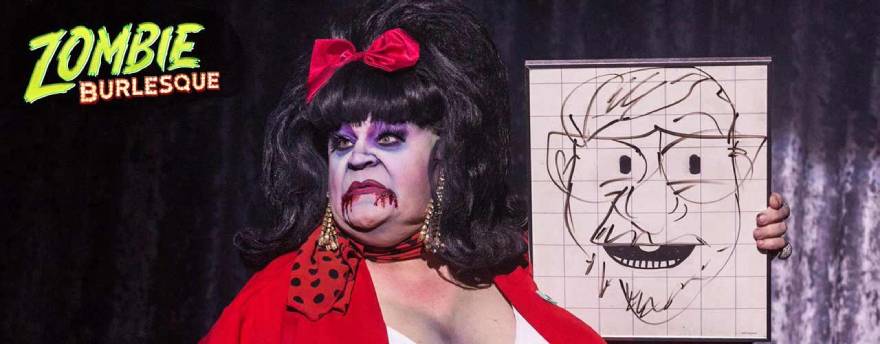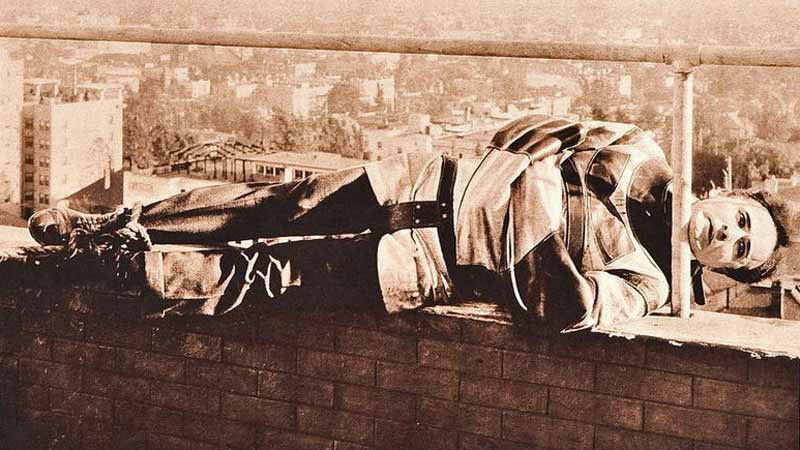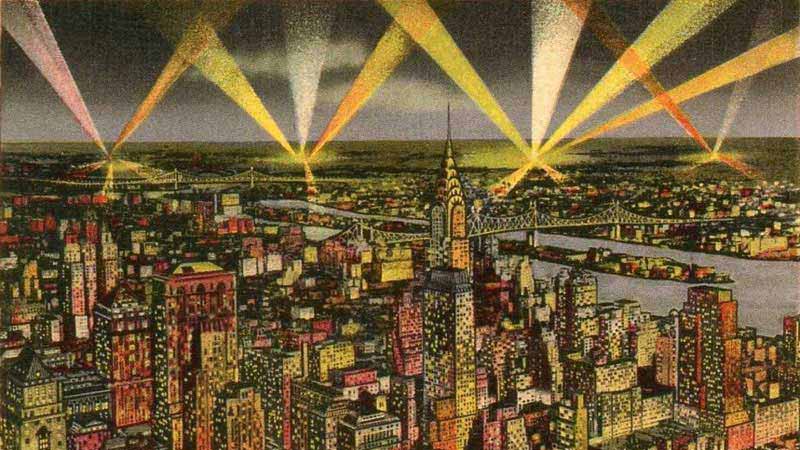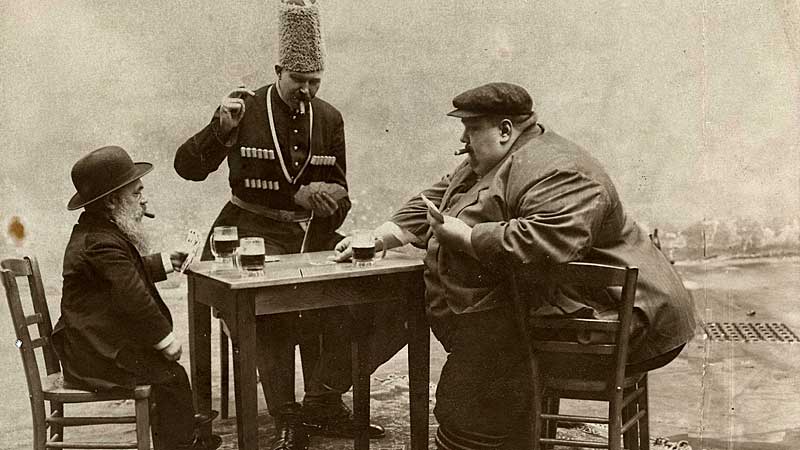Steve Daly's "It's Vegas, Baby... Here I Come!" Podcast Interview
by Roland Sarlot and Christian Painter

What We'll Explore
Steve Daly shares his perspective of when a magician should move to Las Vegas, what range of pay to expect, the initial investment to open your own show, paths of "making it", when television helps your career, and the importance of "paying your dues."
Who is Steve Daly?
Steve Daly has been a consultant on major magic television shows, designed and performed at national theme parks, headlined months long US tours, and performed over 15,000 performances on the Las Vegas strip, including shows like Showgirls of Magic, Zombie Burlesque, V: The Ultimate Variety Show, and Outrageous: The Comedy Hypnosis Show. Steve is a mentor to up-and-coming talent and the founder and convention producer of AbraCORNdabra.
Running Time:
The following interview has been edited and condensed for clarity.
What you can do
You are welcome to share up to 500 words of the below transcript in a non-commercial purpose provided you credit and link back to our site like this: "The Magic Oracle Business Podcast".
The Interview
Roland Sarlot: On this episode of the Magic Business Podcast you'll hear this and more...
Steve Daly: I'm a firm believer in making my owner theaters and I've done it many, many, times over. You've got to zig when everyone else zags. Some producer is going to see me and see my act and go, "Hey, I want him, and I'll give you $20,000 a week.
Roland Sarlot: Welcome to the "Magic Business Podcasts", where we share insightful and delightful inner secrets about the business of magic. This is where magic professionals present their real-life experiences and their most guarded secrets to help further your career in the magical arts. I'm your host, Roland Sarlot in partnership with the MagicOracle.Club, where you can hear all of our Magic Business podcasts.
Our next guest has literally done it all. Steve Daly has been a consultant on major magic television shows, designed and performed national theme park extravaganzas, to headlining month's long US tours. Steve has the very unique distinction of performing in over 15,000 performances on the Las Vegas strip, including shows like Showgirls of Magic, Zombie Burlesque, Buck Wild, V: The Ultimate Variety Show, and Outrageous: The Comedy Hypnosis Show. On top of his already packed schedule, Steve is a mentor to up-and-coming talent and somehow still has time to produce a yearly, and what many people call, "The most friendly magic convention around," AbraCORNdabra. His performances are hilarious, clever, and generally over-the-top. Steve, thank you for sharing your wealth of experience with us.
Steve Daly: Well I'm happy to be hear. Hello Roland, how are you?
Roland Sarlot: It's great to have you on here Steve. I'm excited to talk to you because you are coming straight from Las Vegas.
Steve Daly: Yes I am.
Roland Sarlot: And if somebody has a show, they are doing great wherever they are located around the world, they want to move to Las Vegas and be famous, what do you say?
Steve Daly: No! Of course not. No! Welcome to Vegas, now go home. That's truly the gist of the whole thing. If you've got a big ego and you've got very deep pockets, come on out. You'll have a great vacation out here for however long you want to stay. If you don't have deep pockets and you really want to perform, stay home.
Roland Sarlot: Wow! Ouch.
Steve Daly: Ouch is right.
Roland Sarlot: Most of us don't have deep pockets or a big daddy entrepreneur sending money over. If somebody is good... You've heard it a million times, "You've got a great show, you need to move to Vegas." I'm sure every magician has heard that. How much realistically can a magician make moving out there?
Steve Daly: You know, seriously, you won't make much of anything at all, and they truly will make more money if they stay home. They really will. It really boils down to business. That's the biggest word in the word “show business,” is the word “business”. Sadly, most entertainers don't focus on that big word. They focus on the small word “show”. They spend all their time and energy on the show part, but they don't really pay attention to the business part. That's what gets them into trouble when they come out here. The reason... I came up with a lecture years ago called “Welcome To Vegas, Now Go Home”. I did it all over the country talking about this very same subject. The reason I did it was because all the years I was out here I kept meeting all sorts of magicians that would come from all over the country, because back home they would say, "Dang, you are better than David Copperfield. You should go out to Vegas and have your own show” and they would follow that advice. They would pack up the family, the kids, and their life savings and say, "See you later," and off they would go. They come out here, and within three months they still have no work. The wife has packed up the kids and said, "Screw you, I'm going home." They stay here because they are determined to make it work. They find themselves either working for Houdini's Magic Shop pitching tricks, the same three over and over, which you'll get really good at flying a floating card around you several times if you do, or they end up on the street performing for a dollar tip from anyone that will give them a dollar tip to see them do a card trick. That's just their ego and their stubbornness. Again, it boils down to business. They are just not looking at the business side of things.
To have a show here in Vegas you are in competition with over a hundred shows every single night. If you think about it, back home do you have a hundred shows showing in your city every night? Of course not. So your chances of getting a bigger slice of that pie each night is better if you don't have as much competition. Down here you've got tons of competition. As I said before, if you come out here... If someone's on vacation, not a magician just a layperson, comes out on vacation for the weekend, let's say four days, they are going to see one, maybe two shows. They are not here to see a bunch of shows. They will see one or two shows. That's all they can really afford. They are also going to see the sights, they are going to gamble, they are going to go to some nice dinners. When you've got a hundred shows to pick from and you've saved up your money, and you've saved up for your vacation, and you've got one week, you've got four days out here, are you going to go see Celine Dion, David Copperfield, Carrot Top, any Cirque de Soleil show, Elton John, or are you going to see Bob's Great Magic Show? Of course, you've never heard of Bob's Great Magic Show, and so you are literally scrambling and scraping trying to get anyone to come give you a few bucks to come sit and watch your show in a theatre, in a showroom here.
Roland Sarlot: Well you make it definitely a business case when you say there's a hundred shows a night. That's a lot of competition.
Steve Daly: That's a lot of competition.
Roland Sarlot: How many magicians live in Vegas?
Steve Daly: Stan Allen and I have joked about that for years now. We estimate 5,000, and I'm not kidding. Understand Vegas is one of the most transient cities in America. We were the only city, back in the day, that printed our phone book twice a year because we had that much of a turnover. There's seven thousand families that move into Vegas every single month, and there's five thousand families that move out of Vegas every single month, so with that kind of a turnover you are going to have a lot of people coming and going. Sadly, there is a lot of magicians that come out here and chase their dreams and eventually they go home with their tail tucked between their legs.
Roland Sarlot: Wait, five thousand magicians?
Steve Daly: Five thousand. Yup.
Roland Sarlot: That's a small city of magicians.
Steve Daly: It's a very large magic convention. That is pretty much what I kind of equate moving to Vegas is like. It's like going to and living in a magic convention for months to years. If you want to sit in the halls and jam like you do in a magic convention, you can call pretty much a handful to several dozen magicians any night of the week and they will come sit and jam with you. You can go see a show on the strip for magicians almost nightly. It is kind of like a non-stop magic convention out here, but have you ever gone to a magic convention and made money? Nope.
Roland Sarlot: They cost don't they?
Steve Daly: They do! Even the entertainers at the magic conventions will tell you it costs to go. They don't make the money they normally make, so yeah, again it's like a big long, never-ending magic convention out here.
Roland Sarlot: I really want to work hard. I'm going to make it. I'm going to get through no matter what. Is there venues that people can start out at? Can they do close-up in a restaurant? Can they do street magic? Is there walk-around? I got a great eight minute act. Is there anything that they can start at?
Steve Daly: You know what? I'm a firm believer in making my own theaters, and I've done it many, many times over. You've got to zig when everyone else zags, so if you come out here thinking well, some producer is going to see me and see my act and go, "I'll give you $20,000 a week. You are in. You are a star in Vegas." Not going to happen. Back in the mid 80s, things changed with the showrooms and now we do a thing called four-walling and two-walling. Four-walling and two-walling is basically you are renting the theatre. Not one theatre pays an act any more. It's all producers renting the theatre. You would basically be your own producer if you are going to have your own show. If you can convince a producer to hire you, they might try your act, but you are not going to get paid a whole lot. I would say a good price would be $75 to $100 a night, to do your eight-minute act in their show. It could be as little as $50 a night.
Roland Sarlot: Wait, wait, wait. You are saying that's what a magician will make working. Four to six hundred dollars a week in Vegas.
Steve Daly: Yup.
Roland Sarlot:And these are good magicians?
Steve Daly: Oh yeah. I won't name names, but there are headliners that have worked for $100 a night, and on a steady basis. We are talking two or three year run contracts, where they are only making $100 a night, and they work six nights a week. They are making $600 a week.
Roland Sarlot: And what is their hopes? That they’re big enough just to be in Vegas, or are they thinking they are trying to go to the next level?
Steve Daly: Let's back this up just a second though, because if you're listening to this podcast and you are hearing $600 a week, you might right now be working at McDonalds making $250 a week. You are seeing dollar signs going, "Wow, $600 a week and I can do magic, and I'm performing on a stage. This is great. I'm packing now." Well, understand it is not easy to get into even that slot at $600. You are up against some really big names. Again, I won't name names, but you've seen these guys on national television and you've seen them work all over the place in magic conventions, as headliner stars, and so if you think your act is as good if not better than them then possibly you have a chance. I'm telling you it's not easy, and remember standing in that audition line with you is probably 4,999 other people that feel like they've got a better act than those people. It's not going to be easy in any way shape or form to get in.
Roland Sarlot: And to be national talent and get on television you've got to have been doing this for years. It is not just move to Vegas and I've got a few card tricks.
Steve Daly: Exactly, exactly. National television, let's really talk about that for a second. Is national television doing a five-minute slot on Fool Us? Is that going to make you famous? Is a three-minute slot on Jimmy Kimmel Live going to make you a star? Back in the day it could. Lance Burton, his whole career started thanks to Johnny Carson really. Today, nowadays, no, not at all. I'll give you an example. America's Got Talent, when that came and hit the... What, fourteen seasons, twenty seasons ago? I don't even know how many seasons it has had now.
Roland Sarlot: Forever.
Steve Daly: But in that time... I've never been on America's Got Talent. I've never been on Fool Us. I've never been on any of those shows. I could right now walk up to any layperson on the street and show them my bio, and I could sneak in there I've been on America's Got Talent, and they are going to go, "Oh." They don't care, and they don't know. They've never seen it. They've never seen you, because it was so flooded with so many different acts that anyone could say they were on America's Got Talent and people would just stand there and go, "Oh, that's interesting." It's not going to be the big game-changer. Being on TV isn't really what it used to be. If you were David Copperfield and you had your one-hour special once a year, back when there was only three channels and PBS, that was a big deal, but nowadays not so much.
I was on the first three seasons, every episode of Chris Angel's Mind Freak. Don't hate me. Not my call. I just did the show. I'm amazed at how many people have never seen the show. There are many people who have, of course many magicians have, but there's many lay people that have never seen the show. Never heard of it, never seen it, and it ran eight, nine seasons. Something like that. TV is an interesting creature. It eats material. So once you get on TV and they've seen you, they spit you out and they move on. I've seen it, "Move on, what's next?" I really don't like doing TV. I don't post any of my stuff online. I don't post anything on YouTube. I don't have any of my acts up on YouTube. I don't have any of what I perform with, because I'm old school. Back in the old-days of Vaudeville, that's how you had work. That's how you worked from city to city, no one had ever seen your act before. You could play Davenport, Iowa for a week and then go to Des Moines for a week, and then go to Omaha for a week, and then Kansas City, and then St. Louis. You could work a circuit. Chicago. You could work a circuit, working a week at a time because people didn't have TV. People didn't see all those acts all the time. When TV did come out and you got on let's say the Ed Sullivan show, and you were an act there, that gave you some notoriety because people would say, "Let's go see that live. I want to go see that live. That's pretty amazing." Unfortunately, we have been beat down, if you will, with TV and now computers and online. People are just numb to watching acts and seeing things on TV, and they've all become like television. They've seen it, they spit it out and they've moved on to the next thing.
Roland Sarlot: Back in those days a lot more people even saw it, but now you are saying it is more shotgun rather than the silver bullet.
Steve Daly: Yeah, very much.
Roland Sarlot: You were saying, "Zig when other zag." Is there...Instead of doing these lousy gigs on the street where you don't make very much or forty bucks a night after years and years and years, is it parties, is it connections? What do you recommend to somebody who really wants to do it?
Steve Daly: Get creative. Get creative.
Roland Sarlot: In your act?
Steve Daly: No, in business. Let's get creative. Let's zig when others zag. I don't mean with your act. Your act can be anything. I could right now... If someone handed me... This would be a great challenge. Ooh, I'd love to see this be a challenge. I'd love to hand out twelve basic magic sets. I'm going to give twelve people a basic magic set. Here is your goal, if you will, here is the contest. I dare you to put together a full magic show out of that magic set and go somewhere and create a theatre of your own, and perform that and make money. Now, that could be anything. Sadly, most magicians, or most entertainers are going to sit on their butt and go well, "I don't know how to get a theatre. I don't know how to do it." You've got to get creative. You've got to find your theatre. Make your own theatre. I've walked into restaurants that had a back room in the back and went, "Hey, what are doing with that meeting room back there?" "Nothing, we use it for meetings." "Great, is there any way we can work out a deal where I can come in, and we'll offer a show and dinner package? Let's say it's twenty bucks. You come up with a menu item for ten dollars that you'll make money off of, and I'll put together a show, and we'll split it. I get ten bucks and you get ten bucks. We'll do it on a Tuesday night. Every Tuesday night, maybe once a month or twice a month, in your restaurant, and we'll just push to sell tickets."
Roland Sarlot: Boy, I think I met you actually many years ago on one of your tours, national tours.
Steve Daly: You did!
Roland Sarlot: Yeah, and I was really impressed how you had a niche market, that I don't want to say was underground, but it is not what people normally think about.
Steve Daly: Exactly.
Roland Sarlot: You did hundreds of cities I believe, months long.
Steve Daly: I did.
Roland Sarlot: You were cranking it then, and it was super impressive. I remember you told me it's not easy, but you built it year after year after year. Are you saying those same kinds of concepts. Either you build in Vegas, or you did it in your home town and you take it to Vegas?
Steve Daly: If you build it in your own home town, you are going to be better off. If you try to bring it to Vegas, you are too early. You haven't developed it. You haven't worked the baby up. It's just like a Broadway show. If it plays Peoria, it will play. They always start Broadway shows in Boston and Chicago and other places before they actually take it to Broadway. So you want to kind of hone it away from the big lights of Vegas, or Broadway. Unfortunately, a lot of people don't see that. They want to go straight to the top. They don't want to pay their dues. They want to go straight to the top. I'm good enough. I'm going to go. I've paid my dues. I've worked for three months on this act and I've performed at Joe's Lobster House here in town, and I'm good. I'm ready to go. I'm going to go to Vegas now and have my own show. It just doesn't work that way. You really have to hone it in. Get it worked out.
Lance Burton did nine years as an act at the Tropicana at the Folies Bergere Show. Nine years! Each year the producers would sign him to a new contract and he would say, "May I do a new act?" They would say sure. He would come up with a new ten-minute act that he would do in their show. He would then get to do that act twice a night, six nights a week. Occasionally he'd bring back one of the other acts that he had done before just to keep it up. You know, to keep his chops up with it. He would, over a year's time–six-hundred and fifty shows–he would hone that act and have it ready. After nine years he had nine ten-minute acts that were so well-honed, so well figured out, so well-practiced in front of audiences, that he had a ninety-minute show. And that is when he went to the Hacienda for four years, and finally the Monte Carlo.
Roland Sarlot: Dues.
Steve Daly: Yes, very much. More importantly, no one wants to pay those dues. Understand, before he even came to Vegas to do that 10-minute slot, he was doing an amusement park in Kentucky with Mac King. And they were standing outside doing their act out on an open platform stage outdoors. You got to pay dues. You got to do your time. Nothing happens overnight. Unfortunately, everyone is still thinking everything is fast food. Everything is going to go quick, and it's not. You got to take your time. There is an old saying about enjoying the dance. The object is not to get across the dance floor. The object is to enjoy the dance. So enjoy the dance as you cross the dance floor.
Roland Sarlot: Well, that's always great advice, but when we watch television we see Matt Franco, Shin Lim. We see AGT, and they make it, or they don't make number one but they still get a show in Vegas. I don't want to speak to those two gentlemen in particular.
Steve Daly: Yes and no.
Roland Sarlot: Yes, let's hear more.
Steve Daly: Yes and no. Well, Matt Franco got his own show. Shin Lim didn't. Shin Lim got his own show once a month for a few nights for several months in a row, but not a full-time his own show. It's just an appearance in a room, in the same room that Terry Fator has. The same room that Jay Leno does stand-up in, or Ray Romano. They rotate different people in. It's called a black box. A black box theater is basically you can rotate acts in and out, so it's good, and they are both very successful. They are both fantastic magicians. You never know what kind of a contract you are going to get and how you want to play it out. So again it also depends on what's available out here. The fight for rooms is unbelievable. There are lines of producers waving money at these casinos, waiting to rent the showroom when the next guy is out.
Roland Sarlot: Steve, I have a rich uncle in Hong Kong. He loves my magic and he wants to support me. I want to open a show in Vegas and he just wants to know how much I need. What do you say?
Steve Daly: Half a million dollars. Five-hundred-thousand will get you in the door.
Roland Sarlot: It gets me in the door.
Steve Daly: Yup, if you want to play this poker game, you are going to have to have half a million dollars in chips just to sit down at the table. And I'm not exaggerating that at all. The cost of the room to four-wall, two-wall, the cost of advertising, all of this, all bundles up. Again you are one of a hundred different shows each night. Yeah, a half a million and that might get you through six months.
Roland Sarlot: Wow, half a million. Just to get started.
Steve Daly: Easily. How much would it cost to get your show started in your own home town?
Roland Sarlot: Well, tens of thousands.
Steve Daly: Nowhere near half a million.
Steve Daly: Nowhere near. If you want a nice show that looks good, and you want lights, and you want the whole thing, not a half a million. That's for sure.
Steve Daly: Nope, nope. You can start small with a small close-up show in the corner of a restaurant and work your way up. Save your money. Pay your dues.
Roland Sarlot: Back to dues again, huh?
Steve Daly: Yup, pay your dues and build your name.
Roland Sarlot: Well Steve, as you know all the Magic Business Podcasts can be heard on the MagicOracle.Club, however today you are our guest oracle. That important person with great wisdom and knowledge, so I'd like ask you great and powerful oracle Steve, what's the most important question someone should ask you, but never does.
Steve Daly: Wow, I feel like I'm the great and powerful Oz. Just don't pull the curtain back, don't look, don't look!
Roland Sarlot: I know you have a nice looking turban.
Steve Daly: Yes, I do. We go way too far back Roland. Yes, I do. Why should they come to Vegas?
Roland Sarlot: So they just want to go. They never ask you why.
Steve Daly: Yup, they always just... They never listen. It just goes in one ear and out the other. They just... I get it, that's fine, kudos to them. They are following their dream. There is one thing that I learned myself over the years, and that is you can't learn without making mistakes, and everyone has to make mistakes in order to learn. If everything was just handed to you on a platter, you will never learn anything. I really admire those that do go after it I guess, and make the mistakes. I feel bad for them, that is why I wrote the lecture I did, because I felt so bad seeing so many families wrecked and ruined from people chasing their dreams and not having a good plan. Throwing things against the wall and seeing what's going to stick is one form of business. Not exactly the smartest form of business, but it is a form of business. A smarter one is going to research, and figure it out, and understand the business side of things, and then they are going to know what path to follow. Basically, what you are trying to do is put butts in seats, and those butts in the seats from Omaha, Nebraska, are the same ones that are going to be sitting in Vegas. The ones that are in Dallas, Texas, or in Tucson, Arizona, they are the very same ones that are going to be sitting in your audience in Vegas. They are going to pay a lot more money in the way of an airfare plane ticket, and a show ticket, and hotel room, to see you perform, than if they saw you in your own home town. They have two hands. They are going to applaud you, they are going to cheer you, they are going to enjoy the magic the very same, whether they are sitting in your home town, or they are sitting here paying a lot more to see the very same act, so put that money in your pocket and stay home.
Roland Sarlot: Steve you slapped us around, hit reality into us. Thank you for sharing your years of experience.
Steve Daly: I hope it helps. I really do. I mean that very sincerely. I slap with love, always with love.
Roland Sarlot: Thank you for listening to our "Magic Business Podcasts". Please visit the MagicOracle.Club where you can hear all of our Magic Business podcasts and enjoy a vast array of additional magical knowledge.
I'd like to leave you with a quote from the Greek philosopher Aristotle who wrote, "We are what we repeatedly do. Excellence then is not an act, but a habit." As always, we at the Magic Oracle wish you excellence on your path in the magical arts.
A Jolly Genie?

The Magic Oracle is a FREE site but I still must pay dastardly server fees! Please, donate ANY amount... $1, $5, $10, why not $1 million?
THANK YOU for keeping magic alive... and me, a Jolly Genie!



